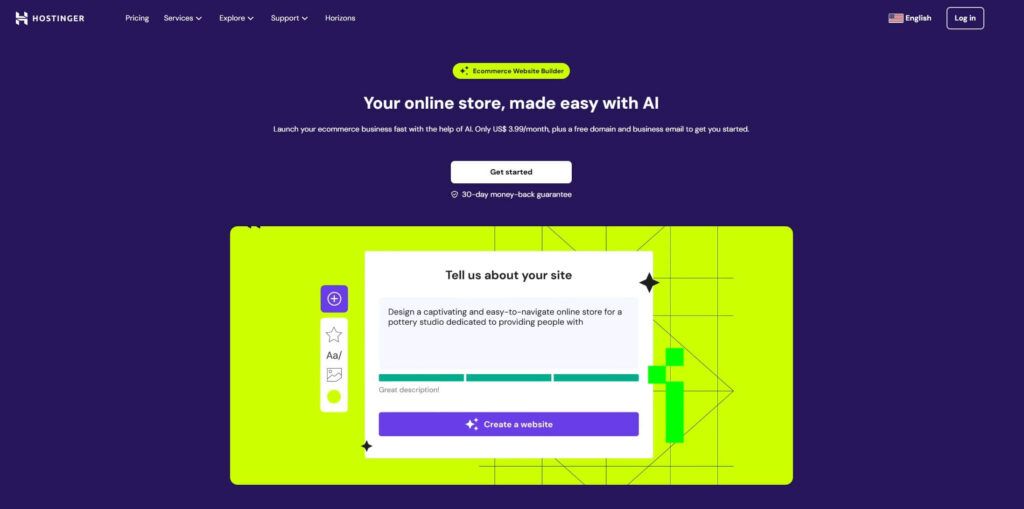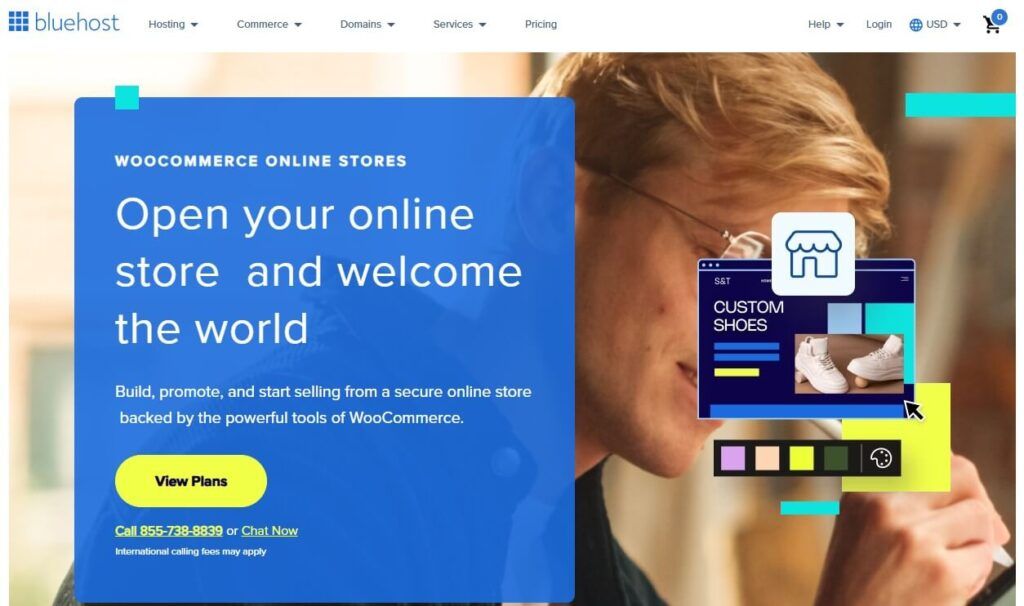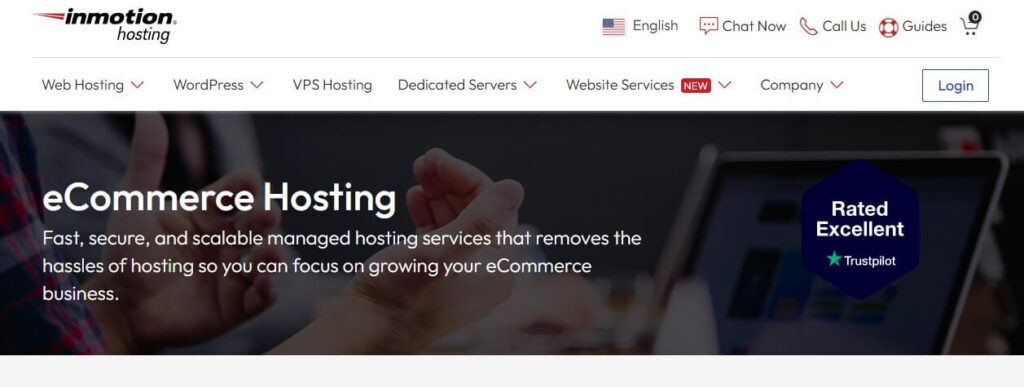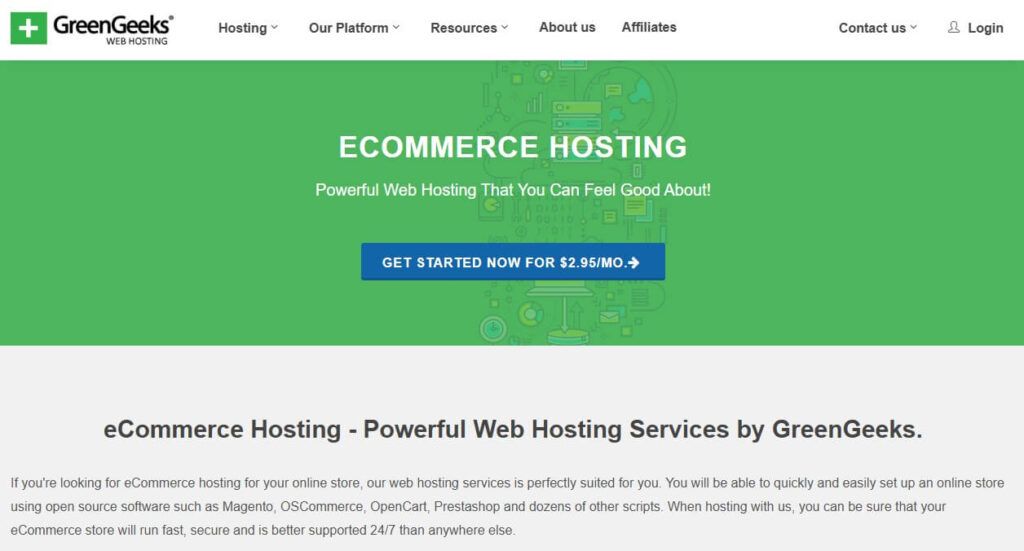Opting for the best eCommerce hosting will ensure stable, long-term revenue. A serious online shop can’t persist on weak, resource-lacking hosting. Simultaneously, you want a slew of e-commerce features and hosting designed to support your online sales fully. Gotcha!
Your days of helplessly seeking the best hosting for eCommerce are done!
Our experts have analysed over thirty so-called ‘best’ options. Guess what? Just six stood out. If you want to find out more, we’ll share our experiences. We won’t leave out their features, advantages, shortcomings, and prices. Scroll down and find an ideal eCommerce hosting for your business.
Before we start, you may want to check out our top-rated Magento hosting providers that allow you to build a Magento-powered online shop. Now, let’s move on with our comprehensive ranking.
Best eCommerce Hosting Ranked: Recap
- Hostinger — the overall best eCommerce web hosting
- SiteGround — the best option for WooCommerce stores
- Bluehost — reliable hosting for online shops
- InMotion Hosting — great for Magento
- DreamHost — eCommerce hosting with an AI website builder
- GreenGeeks — eco-friendly eCommerce hosting
The 6 Best eCommerce Hosting Services: Our Experience
We’ve spilled our beans, but haven’t yet explained the reasoning behind our list. If you have a few more minutes, it would be wise to analyse our experiences with each of the best-rated eCommerce web hosting recommendations.
1. Hostinger

Hostinger is the top web hosting for eCommerce for multiple reasons.
First, it’s very affordable. The Business plan at $3.59 monthly enables all eCommerce features and includes a nifty AI website builder. Hostinger Website Builder, as it’s called, includes 0% transaction fees, over a hundred payment methods, and allows for 600 products to be sold.
Even if you don’t want this eCommerce website builder, you can use Hostinger as a managed WordPress host. You can install WooCommerce and sell online using its various sales-oriented plugins. Hostinger excels at performance, especially uptime, which is nearly 100%.
This is important for online stores that want to ensure 24/7 availability and not miss a single sale. Hostinger also uses LiteSpeed servers that allow top-tier load times, making it easy for customers to browse the product roster. The Business plan allows you to host fifty websites.
You can turn all into online stores or, for example, make a few blogs. Hostiner’s 50 GB of NVMe storage is welcome, while its daily backups, a CDN, and a free domain + WHOIS privacy for a year spice up the deal further. The Business plan includes website staging.
Additionally, you can use its AI tools to create content, improve SEO, and implement product images. Hostinger doesn’t skimp on security, either. Features like DDoS protection, malware removal, and a Web Application Firewall will gladly protect your online store from disasters.
If this is insufficient, consider extras such as 24/7 support, a 30-day refund policy, a custom-made hPanel, one-click WordPress setup, and more. Finally, you can test Hostinger’s cloud and VPS hosting if you require more performance, both at just a few measly dollars monthly.
Pros
- The cheap Business plan allows eCommerce
- It includes an AI Website Builder
- 0% transaction fees
- Built-in free CDN
- Excellent LiteSpeed server performance
- Free domain with WHOIS privacy
Cons
- Its site creator is limited to 600 products
- hPanel takes a while to get used to
2. SiteGround

SiteGround contains a handy website builder, which can complement its eCommerce-friendly hosting. However, SiteGround supports WooCommerce in all plans, which is how this best eCommerce hosting should be used. Should you pick the StartUp plan? We don’t say so.
Instead, we’d choose the GrowBig plan at $6.69 monthly. It’s slightly pricier than Hostinger, but includes space for unlimited sites, 20 GB of storage, and unmetered traffic. Best of all, it’s the same old managed WordPress hosting service with built-in WooCommerce support.
SiteGround is simple to start with. You can set up WooCommerce with a click and enjoy managed updates, a free SSL certificate, and unlimited email addresses. SiteGround uses NGINX web servers, which, combined with a ~100% uptime, bring excellent performance.
SiteGround is even faster than Hostinger, and with a free CDN and static object caching, your online store will perform like a champ. As one of the best hosting services for eCommerce sites, SiteGround lets you add collaborators who can help you manage your online store swiftly.
Security-wise, it’s no less impressive than Hostinger. Users can enjoy a built-in AI anti-bot, malware, and DDoS protection. SiteGround actively monitors your website for threats and promptly eliminates them. Our recommendation, the GrowBig plan, has a few nice extras.
You’ll get WordPress staging, on-demand backups, and 30% faster PHP, improving the server’s response time. SiteGround chiefly avoids offering a free domain for a year, but if you’re lucky, specific promotions offer that. The button below lets you access the latest ones.
Pros
- WooCommerce in all plans
- 100% uptime results in our test
- AI anti-bot and DDoS protection
- WordPress website staging
- On-demand and daily site backups
- Unmetered traffic
Cons
- No free domain for a year
- The StartUp plan misses some features
3. Bluehost

Bluehost is a versatile and reliable eCommerce web hosting in 2025.
Our extensive tests of its eCommerce Essentials plan, which costs $6.95 monthly, revealed what we expected. It includes a wide range of eCommerce tools, including secure payment methods, WooCommerce auto-installation, affiliate programs, email marketing, product subscriptions, and more.
These features are also part of Bluehost’s in-built website builder. However, you can skip this one and install WordPress instead, slap on the WooCommerce add-on, and enjoy. In case you missed that part, WooCommerce is pre-installed, making the initial setup a breeze.
Bluehost’s impeccable eCommerce hosting includes plenty of freebies. For instance, you can host 100 websites on 100 GB of NVMe storage. A free domain with WHOIS privacy is there, and its Cloudflare CDN paired with LiteSpeed servers ensures some of the best speeds.
We measured Bluehost’s uptime to be close to 100%. Rest assured, your store will rarely, if ever, go down. Moreover, Bluehost’s managed WordPress updates make the store maintenance and optimisation simpler. The same goes for security updates and tweaking.
Out-of-the-box features like daily backups, DDoS protection, a Web Application Firewall, and malware scanning work as intended. Interestingly, Bluehost includes a few marketing integrations, such as Yoast SEO, a trial of its pro email, and creative mail for email marketing.
With Bluehost, you’re ready to initiate your eCommerce platform and start selling promptly. If you need more computing resources, Bluehost leverages VPS, cloud, and dedicated servers, albeit at a higher price. Try all of them risk-free with their 30-day money-back guarantee.
Pros
- eCommerce site builder
- WooCommerce is pre-installed
- Cloudflare CDN
- Managed WordPress updates
- Flexible hosting (shared, VPS, cloud)
Cons
- Data centres only in the USA
- Expensive VPS hosting
4. InMotion Hosting

InMotion Hosting is famous for its versatility. This widely adopted eCommerce hosting allows you to install WordPress and make a store through WooCommerce. However, it’s also great for Magento, OpenCart, Drupal, and PrestaShop, all fully supported by InMotion.
By full support, we refer to setup guides to help you start. While InMotion Hosting offers incredibly affordable web hosting plans, we advise its VPS plans, which work phenomenally with many eCommerce platforms. The VPS 2 vCPU plan, at $4.49 monthly, is our #1 pick.
It includes a dual-core CPU, 4 GB of RAM, and 50 GB of NVMe SSD storage. Being a Virtual Private Server, it provides greater speeds and more reliable uptime than shared hosting plans. For example, there’s 5 TB of bandwidth, which allows for massive traffic surges.
Moreover, InMotion includes a dedicated IP address, which eCommerce web hosting usually lacks. Security is top-tier, with DDoS protection and 24/7 website monitoring. InMotion Hosting also relies on cPanel, which helps navigate the hosting environment more easily.
Additionally, each plan supports free website migrations and offers live chat support to help you set everything up. InMotion Hosting’s performance was decent in our tests, likely because of the inclusion of OpCache and Redis cache. Sadly, it’s locked to weekly backups.
You can pay $2.99 monthly on top to unlock daily backups. If not, you’ll do fine with other security measures, such as a free SSL certificate, a 99.9% uptime guarantee, and more. If you prefer shared hosting for eCommerce, choose the Power plan with a free domain name.
Pros
- Great for Magento, Drupal, and OpenCart
- Affordable VPS eCommerce hosting
- Free website migration
- Robust security
- Fast NVMe SSD storage
Cons
- Daily backups cost an extra
- Slightly outdated interface
5. DreamHost

DreamHost wasn’t our number one eCommerce hosting provider in 2025. However, we still recommend it because of its unrelenting performance, intuitive in-house control panel, and unmetered bandwidth. Its best plans are DreamPress, which offer fully managed WordPress hosting services.
As they start at $16.95 monthly, it’s hard to recommend them to budget-friendly users, despite their WooCommerce support, a free domain, and an AI website builder. The Shared Unlimited plan is a slight ‘downgrade’ at only $3.59 monthly, which is our top choice here.
It allows for hosting unlimited websites and includes everything else we mentioned. Thanks to excellent speeds, you can set up WordPress and WooCommerce with a click and enjoy even the most demanding sales add-ons. Its AI website builder is among the best around.
It allows you to create an online store and populate it with products and their descriptions quickly. The Business Advisor in all plans provides essential business advice, while its unlimited SSD storage allows you to scale up your online store without defined limitations.
DreamHost has a massive advantage in unlimited emails for your domain. Furthermore, it provides automatic WordPress updates, which is handy for eCommerce hosting reliant on WooCommerce. Automated daily backups are there, but sadly, on-demand backups are missing.
Ultimately, DreamHost’s best features are preserved for its DreamPress plans. They contain on-demand backups, NGINX web servers, and a CDN. Nevertheless, DreamHost has a massive 97-day money-back guarantee, allowing for a large, risk-free testing period.
Pros
- Award-winning speeds
- 97-day refund policy
- Unlimited business emails
- Automated daily backups
Cons
- Costly managed WordPress plans
- Customer support isn’t 24/7
6. GreenGeeks

GreenGeeks is one of our favourite eCommerce hosting platforms. It offers one-click WooCommerce setups, a free domain, and daily website backups. GreenGeeks is managed WordPress hosting, but you can also use it to create PrestaShop or Magento online stores.
We believe their shared plans are the best, and the Pro plan at $4.95 monthly spikes our interest. All plans have a 300% renewable energy match, making GreenGeeks the greenest web hosting on the planet. It also brags about its AI-driven website creator in all plans.
While it’s also eCommerce-ready, we’d rather use it with a third-party platform. GreenGeeks is ready to support them thanks to LiteSpeed servers, built-in caching, a free CDN, and staging. Users can also enjoy daily and on-demand website backups for more convenience.
GreenGeeks’ cPanel is straightforward, allowing multi-user access for swifter hosting management. The Pro plan allows for staging copies, and since it offers space for unlimited websites, you can make countless copies and experiment with them. Traffic is unmetered, too.
However, it limits you to 50 GB of storage, which is by no means small. GreenGeeks does rely on renewable energy, but its uptime is surprisingly high, at little over 99.96%. However, it’s worth noting that extreme traffic surges can ‘destabilise’ it and skyrocket its response times.
GreenGeeks also offers VPS hosting, albeit at steep prices that most can’t afford. It provides worldwide server locations, including ones in Singapore, making it unique. Lastly, there’s a 30-day money-back guarantee that you can use to try GreenGeeks and gauge its real-life performance.
Pros
- Supports many eCommerce platforms
- Daily website backups
- Unmetered traffic
Cons
- Instabilities during higher traffic
- Higher renewal costs
What to Look for in eCommerce Hosting
Choosing the best eCommerce hosting isn’t the same as looking for Laravel hosting. Each scenario begs for different criteria, and when you want to use hosting as a means of selling online, these parameters are vital:
- eCommerce extras. Business emails, SSL certificates, bandwidth, reliable uptime, and custom domains are handy. Some of them, like custom free domains, reduce the initial investment, while bandwidth ensures your online store never falters under the pressure of many visitors.
- Security features. Online stores require increased security because online sales revolve around money. You want eCommerce hosting with secure payment methods, strong encryption, PCI compliance, DDoS protection, malware removal, and daily site backups.
- Fast page-load speeds. Online stores should be fast, snappy, and responsive to endorse a swift and enjoyable shopping experience. Our top six options excel in this aspect, especially SiteGround’s NGINX servers and built-in caching.
- Hosting management. You want an easy-to-use eCommerce hosting service with a dashboard akin to cPanel or hPanel, where you can manage your sites, security, updates, and collaborators. While we prefer hPanel, cPanel hosting is even more popular nowadays.
- Hosting flexibility. Your eCommerce hosting should provide all hosting types, including shared, VPS, cloud, and dedicated servers. This is quintessential for scalability, for which there will be a need if you start getting more visitors or want to expand your services.
What About eCommerce Website Builders?
Website hosting and building are two different ends of the spectrum. However, they overlap in more than multiple ways. A website builder simplifies the website creation, allowing you to build a website without coding. Logically, it also includes free web hosting to publish and use your website.
Conversely, web hosting provides server resources to host your website. It’s more back-end-oriented and allows more control over your website’s security, backups, updates, bandwidth, storage space, etc. Simultaneously, web hosting often includes a site creator.
In 2025, you can choose either and likely not be wrong.
For instance, Hostinger comes with an AI website builder, one of the best in the business, allowing eCommerce and many online sales tools. But then, we have Wix, a superior website builder overall, but with less hosting customisation and considerably slower load speeds.
On the other hand, Hostinger allows you to build an online store using third-party eCommerce platforms—Wix doesn’t. Hostinger supports Magento, WordPress, OpenCart, and others, which gives you more freedom of choice and better flexibility in designing an online store.
Ultimately, it’s up to you to sort out your priorities.
Hosting is cheaper, allows for more customisation, and allows you to easily migrate to another provider if you don’t like the existing one. Website builders, thanks to many built-in tools, allow for simpler online store creation, but they don’t allow you to migrate to another website builder and typically cost more.
eCommerce Hosting: The Final Verdict
With so many eCommerce solutions, it’s hard to wrap your head around which is the best. We did all the hard work for you to provide you with the best overall eCommerce hosting services in 2025. In our experience, Hostinger was an easy #1 all-arounder offering everything you need for a successful online store.
However, we wouldn’t disregard SiteGround, which, while pricier, often beats Hostinger in speed and uptime. Other options on the list can also suit you, but in our tests, they were just a tad less impressive. As always, the final choice boils down to your business goals, preferences, and needs.
Our number one may not be yours. Examine our recommendations and go for one that ticks all the boxes.
Start Selling Online With Hostinger
Frequently Asked Questions
Is shared hosting enough for an online store?
Yes, it’s usually sufficient. Website builders, one of which is Shopify, provide shared hosting. Shopify is built for large online stores with immense needs for selling hundreds, if not thousands, of products. Guess what? Online shops built with it perform well.
In most cases, shared hosting is enough for online stores; however, VPS and cloud hosting offer more performance. They’re more scalable and less prone to instabilities during traffic spikes. Plus, if you use a resource-demanding platform, like Magento, you’ll need powerful computing resources to support it fully.
We recommend starting with shared hosting and scaling up if needed. VPS hosting, in particular, is a significant upgrade, and Hostinger allows you to get one for just a few dollars.
How much will eCommerce hosting cost me?
The cost of the best eCommerce hosting is a few dollars a monthly. However, all hosting providers charge you upfront for the given period—a year, two, three, or more. That said, the initial investment will likely reach hundreds of dollars, but you’re ‘peaceful’ for an extended period.
Let’s take Hostinger as an example. The Business plan costs $3.99 and includes a free domain, WHOIS privacy, and other features mentioned above. After a year, you’ll have to pay for a domain and WHOIS privacy together, which should cost no more than $40 annually.
Is there any free eCommerce web hosting?
No. Free web hosting is usually a poor option for eCommerce, especially because its uptime, performance, and features are terrible. Free website builders, such as Weebly, allow you to sell online, but you’re again constrained features-wise, plus, you don’t get a custom domain.
We’d never use free hosting unless we need a ‘personal’ website that won’t get thousands of monthly visitors. Otherwise, it’s better to pay for hosting, especially for an online store that must work like a well-oiled machine to avoid missing out on potential sales.